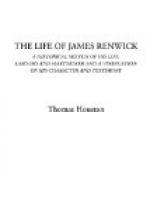Continuing in Edinburgh to prosecute his studies, he was brought to attend the private fellowship-meetings of the persecuted covenanters. He met with the “outed” ministers, and was led to study, by the light of the Divine word and the teaching of the Spirit, the exciting and deeply important questions of the day. Thus did he become convinced of the numerous defections from the principles and ends of the Covenanted Reformation, of the majority of the ministers and Presbyterian people of Scotland; and he was persuaded that the stricter Covenanters,—the followers of Cargill and Cameron, and those associated in Societies, and who frequented conventicles,—alone consistently carried out the grand principles and aims of the national vows. At length, after much searching of heart, and according to his words, testifying to his deep conscientiousness, “with great grief, reluctance, and trembling of soul,” he became identified with the persecuted remnant. Soon after, while yet only nineteen years of age, Renwick witnessed the martyrdom of the venerable servant of Christ, Donald Cargill. He stood near the scaffold, beheld his courageous and triumphant departure to glory, and heard the clear and powerful last words, in which he nobly testified for the crown-rights of the Redeemer, and against Erastian usurpation. “As to the causes of my suffering,” said the dying martyr, “the chief is—not acknowledging the present Authority, as it is established in the Supremacy and Explanatory Act. This is the magistracy I have resisted, that which is invested with Christ’s power. Seeing that power taken from Christ, which is His glory, and made the essential of an earthly crown, it seemed to me as if one were wearing my husband’s garments, after he had killed him. There is no distinction we can make, that can free the acknowledger from being a partaker of this sacrilegious robbing of God. And it is but to cheat our consciences to acknowledge the civil power alone, that it is of the essence of the crown; and seeing they are so express, we ought to be plain; for otherwise, we deny our testimony and consent that Christ be robbed of His glory.”
These mighty utterances, so solemnly confirmed by the martyr’s blood, could not fail to make a deep impression on the heart of the youthful Renwick. His purpose was fixed, and his resolution taken, to maintain the same great principles; and reproach and persecution and death could not turn him aside. His Christian decision had its reward. He declared that he did not fully know what the gracious presence of God with His people meant, till he joined the fellowship of the persecuted remnant. A large measure of the spirit of the “faithful Cargill” rested on his youthful successor; and when, some two years after, he entered on the work of the ministry, it was justly said—“he took up the Covenanted Banner as it fell from the hands of Cargill.”




